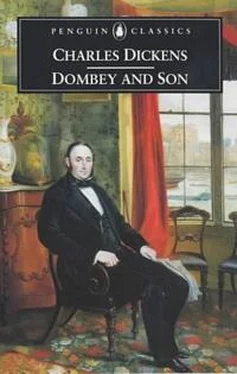To go back to old Sol Gills at the wooden Midshipman's, and not first go round to ask how Mr Dombey was — albeit the house where he lay was out of London, and away on the borders of a fresh heath — was quite out of the Captain's course. So he got a lift when he was tired, and made out the journey gaily.
The blinds were pulled down, and the house so quiet, that the Captain was almost afraid to knock; but listening at the door, he heard low voices within, very near it, and, knocking softly, was admitted by Mr Toots. Mr Toots and his wife had, in fact, just arrived there; having been at the Midshipman's to seek him, and having there obtained the address.
They were not so recently arrived, but that Mrs Toots had caught the baby from somebody, taken it in her arms, and sat down on the stairs, hugging and fondling it. Florence was stooping down beside her; and no one could have said which Mrs Toots was hugging and fondling most, the mother or the child, or which was the tenderer, Florence of Mrs Toots, or Mrs Toots of her, or both of the baby; it was such a little group of love and agitation.
'And is your Pa very ill, my darling dear Miss Floy?' asked Susan.
'He is very, very ill,' said Florence. 'But, Susan, dear, you must not speak to me as you used to speak. And what's this?' said Florence, touching her clothes, in amazement. 'Your old dress, dear? Your old cap, curls, and all?'
Susan burst into tears, and showered kisses on the little hand that had touched her so wonderingly.
'My dear Miss Dombey,' said Mr Toots, stepping forward, 'I'll explain. She's the most extraordinary woman. There are not many to equal her! She has always said — she said before we were married, and has said to this day — that whenever you came home, she'd come to you in no dress but the dress she used to serve you in, for fear she might seem strange to you, and you might like her less. I admire the dress myself,' said Mr Toots, 'of all things. I adore her in it! My dear Miss Dombey, she'll be your maid again, your nurse, all that she ever was, and more. There's no change in her. But, Susan, my dear,' said Mr Toots, who had spoken with great feeling and high admiration, 'all I ask is, that you'll remember the medical man, and not exert yourself too much!'
Florence had need of help. Her father's need of it was sore, and made the aid of her old friend invaluable. Death stood at his pillow.
A shade, already, of what he had been, shattered in mind, and perilously sick in body, he laid his weary head down on the bed his daughter's hands prepared for him, and had never raised it since.
She was always with him. He knew her, generally; though, in the wandering of his brain, he often confused the circumstances under which he spoke to her. Thus he would address her, sometimes, as if his boy were newly dead; and would tell her, that although he had said nothing of her ministering at the little bedside, yet he had seen it — he had seen it; and then would hide his face and sob, and put out his worn hand. Sometimes he would ask her for herself. 'Where is Florence?' 'I am here, Papa, I am here.' 'I don't know her!' he would cry. 'We have been parted so long, that I don't know her!' and then a staring dread would he upon him, until she could soothe his perturbation; and recall the tears she tried so hard, at other times, to dry.
He rambled through the scenes of his old pursuits — through many where Florence lost him as she listened — sometimes for hours. He would repeat that childish question, 'What is money?' and ponder on it, and think about it, and reason with himself, more or less connectedly, for a good answer; as if it had never been proposed to him until that moment. He would go on with a musing repetition of the title of his old firm twenty thousand times, and at every one of them, would turn his head upon his pillow. He would count his children — one — two — stop, and go back, and begin again in the same way.
But this was when his mind was in its most distracted state. In all the other phases of its illness, and in those to which it was most constant, it always turned on Florence. What he would oftenest do was this: he would recall that night he had so recently remembered, the night on which she came down to his room, and would imagine that his heart smote him, and that he went out after her, and up the stairs to seek her. Then, confounding that time with the later days of the many footsteps, he would be amazed at their number, and begin to count them as he followed her. Here, of a sudden, was a bloody footstep going on among the others; and after it there began to be, at intervals, doors standing open, through which certain terrible pictures were seen, in mirrors, of haggard men, concealing something in their breasts. Still, among the many footsteps and the bloody footsteps here and there, was the step of Florence. Still she was going on before. Still the restless mind went, following and counting, ever farther, ever higher, as to the summit of a mighty tower that it took years to climb.
One day he inquired if that were not Susan who had spoken a long while ago.
Florence said 'Yes, dear Papa;' and asked him would he like to see her?
He said 'very much.' And Susan, with no little trepidation, showed herself at his bedside.
It seemed a great relief to him. He begged her not to go; to understand that he forgave her what she had said; and that she was to stay. Florence and he were very different now, he said, and very happy. Let her look at this! He meant his drawing the gentle head down to his pillow, and laying it beside him.
He remained like this for days and weeks. At length, lying, the faint feeble semblance of a man, upon his bed, and speaking in a voice so low that they could only hear him by listening very near to his lips, he became quiet. It was dimly pleasant to him now, to lie there, with the window open, looking out at the summer sky and the trees: and, in the evening, at the sunset. To watch the shadows of the clouds and leaves, and seem to feel a sympathy with shadows. It was natural that he should. To him, life and the world were nothing else.
He began to show now that he thought of Florence's fatigue: and often taxed his weakness to whisper to her, 'Go and walk, my dearest, in the sweet air. Go to your good husband!' One time when Walter was in his room, he beckoned him to come near, and to stoop down; and pressing his hand, whispered an assurance to him that he knew he could trust him with his child when he was dead.
It chanced one evening, towards sunset, when Florence and Walter were sitting in his room together, as he liked to see them, that Florence, having her baby in her arms, began in a low voice to sing to the little fellow, and sang the old tune she had so often sung to the dead child: He could not bear it at the time; he held up his trembling hand, imploring her to stop; but next day he asked her to repeat it, and to do so often of an evening: which she did. He listening, with his face turned away.
Florence was sitting on a certain time by his window, with her work-basket between her and her old attendant, who was still her faithful companion. He had fallen into a doze. It was a beautiful evening, with two hours of light to come yet; and the tranquillity and quiet made Florence very thoughtful. She was lost to everything for the moment, but the occasion when the so altered figure on the bed had first presented her to her beautiful Mama; when a touch from Walter leaning on the back of her chair, made her start.
'My dear,' said Walter, 'there is someone downstairs who wishes to speak to you.
She fancied Walter looked grave, and asked him if anything had happened.
'No, no, my love!' said Walter. 'I have seen the gentleman myself, and spoken with him. Nothing has happened. Will you come?'
Читать дальше











